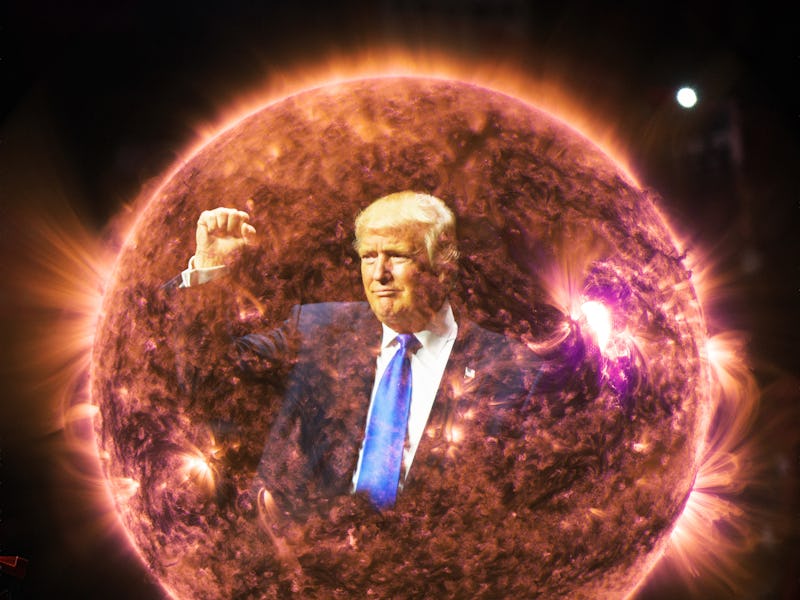Space Exploration and Mars Under President Donald Trump

For half of the country, it’s a somber Wednesday. In the aftermath of the 2016 United States election, which left billionaire celebrity Donald Trump as President-elect, reasonable citizens are beginning to wonder how policies may shift. Domestic and international policies, especially given the Republican Senate election results, are bound to change. Despite these uncertainties, there remain venues within which despondent U.S. citizens can find hope, inspiration, or some positive emotion.
For instance: Space! Space still exists, and we’re still hot on its tail. And, despite possible impending changes on Earth, Mars continues to beckon. Already, NASA is working hand-in-hand with private space exploration and colonization companies, like Elon Musk’s SpaceX and Jeff Bezos’s Blue Origin. And from all indications, a Trump presidency will not alter that trajectory. Under Trump, Americans can still hope to colonize the Red Planet.
Half the country would really like to be on that rocket.
The billionaire celebrity has spoken about space policy and exploration a number of times over the past two years, ever since he began masquerading as a politician. Early on, he shied away from details; he tended to laud NASA’s accomplishments, but was quick to imply that it, along with everything else in the country, needed a facelift. He took to praising space exploration — “Honestly, I think [the idea of putting humans on Mars is] wonderful,” he told a New Hampshire audience in August, 2015; “Honestly I think NASA is wonderful! America has always led the world in space exploration,” he wrote on Reddit in July, 2016 — but would quickly hedge his approval.
Mars, after all, is a far-off dream; Trump’s constituency demonstrated a greater responsiveness to Trump’s passionate, albeit tenuous avowals to solve our innumerable real-world problems. So, while Trump would not say anything negative about space, he would actively attempt to reroute the question. “Right now, we have bigger problems, you understand that,” Trump told that same New Hampshire audience. “We have to fix our potholes. We don’t exactly have a lot of money.”
Sand dunes on Mars.
As his campaign progressed (or regressed, depending on the observer), Trump began to elaborate, some, at least to certain audiences. SpaceNews interviewed Trump and Hillary Clinton in early October; though Clinton’s responses were on average three times longer than Trump’s, Trump managed to eke out some details. His comments weren’t exactly inspirational — they read as merely diplomatic. When asked about NASA’s plans to send humans to Mars, Trump espoused pragmatism: “After taking office, we will have a comprehensive review of our plans for space, and will work with Congress to set both priorities and mission,” he said. Later in the interview, he said he supported cooperative, public-private endeavors; SpaceX, if not also Blue Origin, undoubtedly breathed a sigh of relief.
As October progressed, Trump began tooting NASA’s horn once again, and this, as far as we can now understand it, exemplifies Trump’s current stance on space. He took his somehow effective Make America Great Again campaign and applied it to the National Aeronautics and Space Administration. NASA, Trump argued, used to be great; now, due (no doubt, in Trump’s mind) to previous Commander in Chiefs’ missteps, it had been relegated to lowly aspirations, and had lost sight of its former ambitions. If he led the nation, Trump started to say, NASA could once again reach for the stars.
NASA Administrator Charles Bolden.
“I will free NASA from the restriction of serving primarily as a logistics agency for low-Earth-orbit activity. Big deal. Instead, we will refocus its mission on space exploration. Under a Trump administration, Florida and America will lead the way into the stars,” he said in Florida on October 25. He explained, though, that it would be a cooperative effort between the public and private sector, to “maximize the amount of investment and funding that is available for space exploration and development. This means launching and operating major space assets, right here, that employ thousands and spur innovation and fuel economic growth.”
In essence, Trump gave all listeners something to nod about. He placated everyone interested in getting humans — particularly Americans — to space, but did not voice support for any policies that could’ve made an intrepid listener frown. Those who are not somber on this post-election Wednesday can continue to dream of Mars. And those who are somber on this post-election Wednesday can begin to dream of defecting to Mars. There’s no telling what Earth will look like after four Trump years, but there’s a whole new planet up in the sky. And Trump, for all his character flaws, doesn’t seem interested in foiling those initiatives.